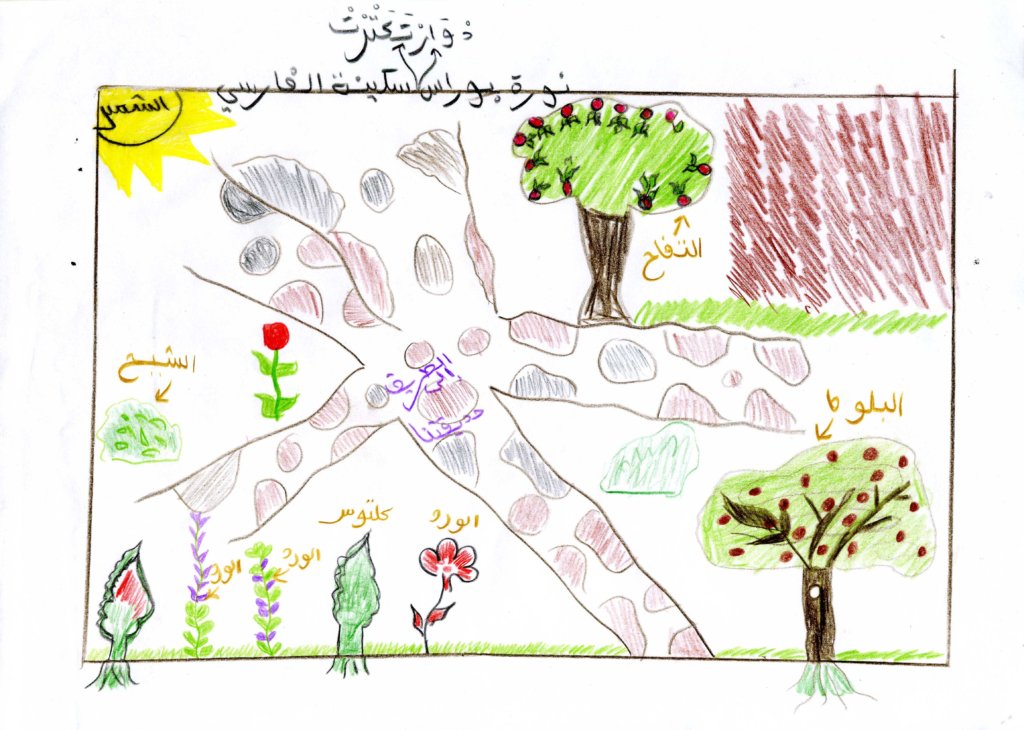By Hasnaa Benlafkih | Project Leader
During the past three months, Global Diversity Foundation (GDF) organized two workshops at Dar Taliba, involving the girls housed at the institution in hands on creative and educational activities.
Irene Teixidor Toneu, a Ph.D student from the University of Reading in the UK who is researching medicinal plant use in the High Atlas, led the first workshop on October 14th 2015. It tied into GDF’s current plans for a permaculture ethnobotanical garden at Dar Taliba and gave the girls the opportunity to actively contribute to the design and plans for the garden. The girls were encouraged to use their imagination and work in teams based on the villages of the High Atlas they come from. The result was colorful diagrams and drawings as well as a list of plants cultivated in each of the villages represented by the girls, and that they wish to include in the ethnobotanical garden. This workshop also had an educational aspect as Irene encouraged the girls to think about what made particular plants ethnobotanical or useful to people. Relying on an interactive method, she asked the girls to describe and list the different uses of the region’s most popular plants and then explained some of the basic chemical or physical properties that make these useful to human beings. Irene was a great fit for this workshop because she has spent many months living with communities in the High Atlas while conducting fieldwork and is very well versed in the ethnobotanical landscape of the region. She is also familiar with plant names in the girls’ native language, Amazigh. Meeting her also exposed the girls to one of the many applications of ethnobotany and the career opportunities the field holds.
The second workshop took place on December 16th and was led by Said Taj, a local florist and artist who often works with nonprofits and leads creative workshops for children. During his day-long workshop, he worked with 6 different groups of up to 20 girls to make floral head wreaths using a variety of common local plants; some of these were harvested from Dar Taliba’s gardens, including raffia palm, roses, oleander, bougainvillea, chamaerops palm and carob leaves. Said introduced the girls to some of the basics of ornamental plants including the symbolism associated with different colors and taught them how to make tissue paper flowers. This hands-on workshop gave the girls an opportunity to be creative and have fun as well as brought them a new-found appreciation of ornamental plants they are familiar with. It also exposed them to one of the many plant-related vocations: floristry.
By bringing activities like the Floral Wreath Making workshop and Ethnobotanical Plants garden planning session to Dar Taliba, Global Diversity Foundation is making opportunities most often unavailable to rural and underprivileged children accessible to the girls residing at the boarding house. This is an important aspect of GDF’s mission to maintain and support ethnobotanical knowledge and biodiversity in the communities most dependent on their local flora for both cultural and livelihood purposes.
Donating to our Global Giving campaign allows GDF to continue broadening horizons for the girls at Dar Taliba and enables the foundation to actively contribute to the valorization of environmental stewardship in the High Atlas. Thank you for your support!
Links:
By Hasnaa Benlafkih | Project Leader
By Hasnaa Benlafkih | Project Leader
Project reports on GlobalGiving are posted directly to globalgiving.org by Project Leaders as they are completed, generally every 3-4 months. To protect the integrity of these documents, GlobalGiving does not alter them; therefore you may find some language or formatting issues.
If you donate to this project or have donated to this project, you can receive an email when this project posts a report. You can also subscribe for reports without donating.
Support this important cause by creating a personalized fundraising page.
Start a Fundraiser